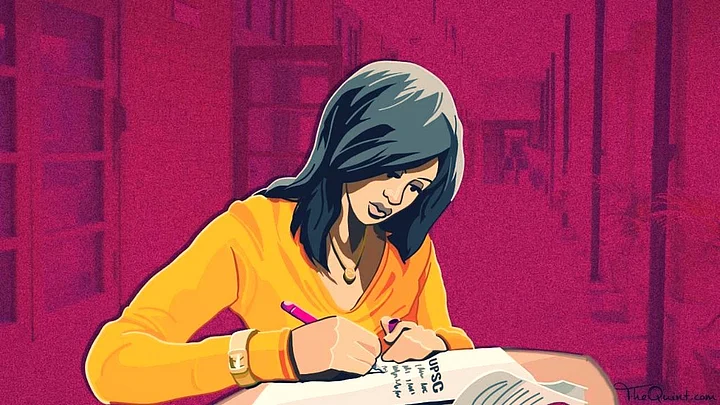By the end of this week, a group of 100 petitioners will file a writ petition in the Supreme Court regarding the “ambiguous” questions asked in this year’s Union Public Service Commission (UPSC) exam.
At least four questions asked in the General Studies paper in UPSC Civil Services Preliminary examination held on 18 June could “have had more than one plausible answer”, according to the petitioners.
The ambiguous questions have caused great confusion among aspirants, many of whom even sent their representations via emails and letters to the UPSC to highlight the issue of erroneous questions in the exam. In the absence of any reply from the Commission and the results being declared soon after, it became clear that UPSC was least bothered.Vishal, One of the Petitioners
What Really is the Case?
According to the petitioners, the following four multiple choice questions were either framed on disputed facts or worded in a way that a single answer wasn’t possible:
- Is the right to vote and to be elected a Constitutional or a Legal Right?;
- Where in India does seawater recede a few kilometers from the shoreline twice a day and then return to the shore?;
- What are the cultural differences between civilisations of the Rig Vedic Aryans and the Indus Valley people?; and
- For election to the Lok Sabha, who can file nomination?
In the first question, for instance, aspirants had to answer whether ‘right to vote and to be elected’ is a fundamental right, a natural right, a constitutional right or a legal right. The petitioners contend that while an SC judgment on NOTA in 2013 calls the right to vote a ‘statutory right’, a 2015 SC judgment (Rajbala & others Vs State of Haryana and Others) observed it was a ‘constitutional right’.
Similarly, quoting government websites, the aspirants contend that there are 2 “correct” answers to the second question. Quoting from the Gujarat and Odisha government websites, the petitioners say the phenomenon of seawater receding a few kilometers from the shoreline occurs both in Chandipur and Bhavnagar.
In the same vein, petitioners have asserted that questions 3 and 4 also don’t have a single “right” answer.
Why This Is a Big Deal For Aspirants
Alleging gross injustice at the hands of the UPSC, the aspirants also explained how this “ambiguity” worsens their case due to negative marking in the exam.
For each correct answer, the student gets 2 marks and for each incorrect answer, 0.67 marks are deducted from the total marks scored. Therefore, ambiguity in four questions puts 10.66 marks at stake which is nearly an insane 10 percent of the expected cut-off.Vishal, One of the Petitioners
The “ambiguities in the paper”, according to the petitioners, severely affects those candidates who had 2017 as their last attempt.
According to them, this is not the first time that there have been errors in a UPSC paper.
In the 2016 Civil Services (Mains) exam, there was a translation mistake where the word “Engendered” was incorrectly used to mean “stree-purushon ke saman sarokar” ie, ‘gender-inclusive’, whereas the word ‘engender’, according to the English dictionary, actually has nothing to do with gender.
The Central Question of Ambiguity
Kabir Choudhary, the counsel representing the petitioners, believes the UPSC should come out clean with an answer key to the questions and address the doubts that aspirants have. Currently, the answer key comes out after all the three stages – prelims, mains and personality test – are over, leaving students with little to no chance to seek remedy.
The questions have more than one right answer according to textbook references. The point is that even if a latest judgment calls right to vote a constitutional right, the 2017 NCERT textbook hasn’t been updated to reflect that, as it still calls it a fundamental right. This creates an ambiguity which is unfair to the aspirants. The UPSC exam should be a game of intelligence, not luck.Kabir Choudhary, Counsel to the Petitioners
While petitioners are demanding an independent committee to look into the questions and submit a report, legal experts are divided about the ‘ambiguity’ of one of the questions.
“In the question about right to vote, the right answer is constitutional right, since the SC judgment given in 2015 will hold over the one given in 2013,” Alok Prasanna Kumar, a Bengaluru-based advocate said. Kumar, however, conceded that the question could have been framed better.
Another legal expert believes that the options to this particular question are conflicting. “In a situation where there are two conflicting judgments, the question shouldn’t have been asked in the first place. A 2015 judgment does not overrule the 2013 judgment, making it highly difficult for students to choose the right answer,” he said.
“In an objective-type question paper, where the student cannot provide an explanation, there can’t be any scope for ambiguity. The UPSC needs to respond with the answer key and provide students with the academic material that they have based their answers on,” Choudhary added.
Till that happens, it seems like a long battle for these petitioners.
(#TalkingStalking: Have you ever been stalked? Share your experience with The Quint and inspire others to shatter the silence surrounding stalking. Send your stories to editor@thequint.com or WhatsApp @ +919999008335. )
(At The Quint, we question everything. Play an active role in shaping our journalism by becoming a member today.)
